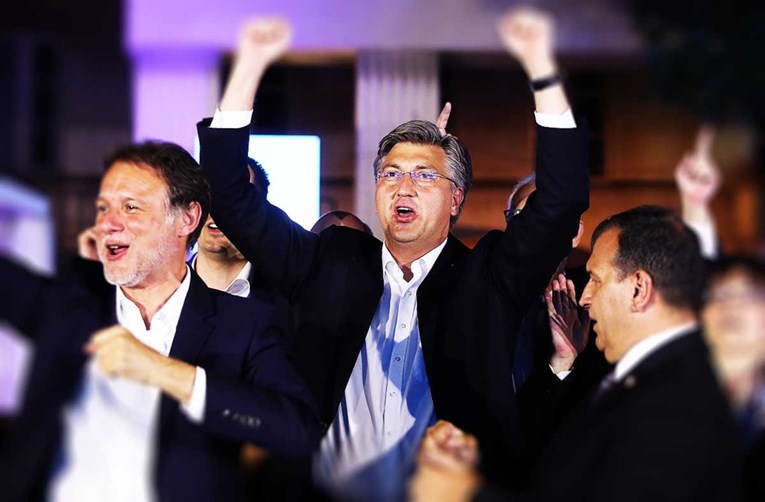A landslide victory of the HDZ

THE HDZ (Croatian Democratic Union) won the elections.
It was clear that the HDZ would win after the exit poll results came in, but the first official results confirmed the party's victory.
The first official results suggested that the HDZ was set to win 71 seats, but the number slightly decreased as results from more polling stations came in.
By two o'clock in the morning, over 98 percent of the votes had been counted.
HDZ has won 66 seats. The SDP's (Social Democratic Party's) Restart coalition has experienced an abysmal failure, winning only 41 seats.
Miroslav Skoro and his Domovinski pokret (Homeland Movement) have won 16 seats, but contrary to all predictions, their seats will not be essential in forming a government.
Most (Bridge of Independent Lists) has won eight seats and thus showed that they are a party with a solid stronghold in Croatian politics.
The biggest surprise of these elections is the platform gathered around the Mozemo (We Can) party. They won seven seats, mostly in Zagreb, and thus created an opportunity to be one of the main contenders for the position of mayor of Zagreb at a local level.
A coalition gathered around the Pametno (Intelligently) party is also entering the parliament. Dalija Oreskovic, Dario Zurovec, and Marijana Puljak, who won a seat in the tenth constituency at the last minute, are entering the parliament.
The HNS (Croatian People's Party) has won one seat and thus, despite predictions to the contrary, continues to exist as a parliamentary party. Radimir Cacic and his reformists have also won one seat.
Plenkovic gave a speech
However, the HDZ won by a landslide. All pre-election analyses and polls predicted that the government would not be formed easily. Moreover, most polls and analysts gave Bernardic's Restart coalition a better chance of a relative victory. Not only did that not happen, but the SDP experienced an utter failure in the elections. It will take a lot of knowledge, willpower, and ability to get the party back on its feet, and those are the things that the party is currently lacking.
Plenkovic gave a rather short speech, in which he mostly thanked the voters. The speech was interrupted by applause a few times. The atmosphere in the HDZ headquarters was more or less calm, regardless of the victory, not even close to the unforgettable party in 2015. Moreover, Plenkovic did not come on stage accompanied by a patriotic song. Instead, he was accompanied by the song Eye of the Tiger, and there were no flags.
"Such support is a huge obligation for us, and we will make sure we always keep it in mind. Croatia needs solutions for challenges that both the economy and the public health are facing, and it also needs to strengthen institutions, human and minority rights," Plenkovic said in his speech.
When compared with the results of previous years, it is clear that this is one of the greatest victories of the HDZ.
Previous election results
In 2003, 59.59 percent of the total number of voters voted in the elections, and the HDZ won the most seats - 66, followed by the SDP (Libra, LS, IDS) with 43 seats. As for the percentage of the seats won, HDZ won 43.42 percent of the seats. The SDP, along with Libra, LS and IDS won 28.29 percent of the seats.
In 2007, Sanader's HDZ won 61 seats plus five from the diaspora, while the SDP won 56 seats.
In 2011, the HDZ won 44 seats plus three from the diaspora, while the SDP's Kukuriku coalition won 80 seats plus one minority seat. About 62 percent of registered voters voted in the elections, whereas yesterday, 47 percent of voters voted.
In 2015, the SDP and HDZ coalitions won an equal number of seats – 56. The Domoljubna koalicija (Patriotic Coalition) won 746,056 votes in ten constituencies, and 24,444 votes from the diaspora. 60.82 percent of voters voted in the elections.
In 2016, the HDZ also won easily, winning 61 seats, and the SDP-led coalition won only 54 seats. Plenkovic's HDZ won about 70 thousand fewer votes than in 2015, "only" 695,791, which includes votes from the XI constituency. Only 52.59 percent of the total number of voters voted in these elections.



 Facebook
Facebook
 Google
Google